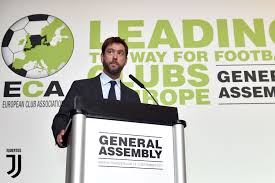By Andrew Warshaw
June 7 – The umbrella body representing European clubs insists that peace and harmony has broken out among its members and that while there are understandable concerns about the future of the Champions League from all parties, there are no longer any divisions.
Earlier this week Spanish and English clubs issued strongly-worded statements against plans by UEFA – backed by the European Club Association – that threatened to seriously disrupt the ECA’s special general assembly in Malta.
The assembly was expected to provide a platform for supporting UEFA’s blueprint to overhaul its elite competition from 2024 and stave off criticism from leagues across Europe.
But afterwards, reporters were left scratching their heads as it became clear the two-day talk shop was exactly that and came up with absolutely nothing new in terms of putting flesh on the bones of any new format -– except to confirm that clubs, leagues and UEFA would sit round the table in September to thrash out their differences.
“My biggest satisfaction is that all the scepticism and fear has now been brushed off,” ECA chairman and Juventus chief Andrea Agnelli (pictured) declared.
In an attempt to pacify Europe’s leagues who are seriously worried about their domestic competitiveness being undermined, Agnelli called for patience on all sides.
“We don’t have all the answers, nothing is set in stone and it’s going to be a long process, maybe a matter of months,” before it is established exactly how the various UEFA competitions will look, he said.
“We have time ahead of us. All the clubs have now seen our vision, understand what is being debated and that we are committed to an open and honest consultation process.”
Implying that some of Europe’s wealthiest clubs were focussing too much on self-interest, Agnelli added: “The clubs want a solution that works for all of European football, not just some of them.”
Agnelli and the ECA board have become increasingly irritated in recent weeks at media reports denouncing the proposed new Champions League arrangements which, on paper at least, look dangerously like a closed shop with only a few spots available for qualifying through domestic leagues.
He and his executives were at pains to point out that there was far more to the proposed revamp than just Europe’s elite competition and that what will happen at lower-tier level would also provide authentic European competition for mid-sized and smaller clubs.
The problem is, no-one round the table at a post-assembly press conference would, or maybe could, say precisely what form this might take.
Nevertheless, said Agnelli, the mood of conflict was over.
“This is now the start of the process in terms of consultation,” he said. “All clubs have embraced this, they have all given their comments. It’s not an easy task going ahead. What is important is that stakeholders engage honestly to design a plan for what is best for europe going forward.”
“Yes some clubs have voiced genuine concerns … but if we find the right balance, we can hit a growth market without being detrimental to the leagues. But we have to find that balance. That’s the objective we all have.”
Contact the writer of this story at moc.l1745643488labto1745643488ofdlr1745643488owedi1745643488sni@w1745643488ahsra1745643488w.wer1745643488dna1745643488

